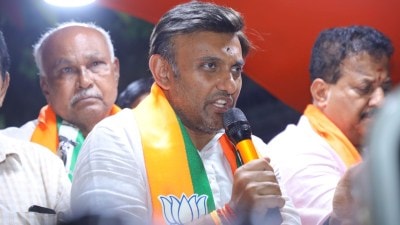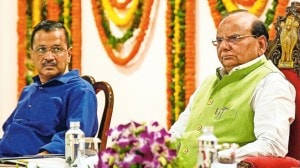- India
- International
In a first, JMM discloses electoral bond details: Rs 1 crore from Hindalco
Headed by former Jharkhand Chief Minister Shibu Soren, the state party, in its contribution report for the financial year 2019-20 submitted to the Election Commission (EC), has revealed that it received Rs 1 crore from Hindalco Industries Limited through an electoral bond.
 The report mentions that the donation came via bond number AAACH1201R issued by the Court Compound Branch of the State Bank of India (SBI).
The report mentions that the donation came via bond number AAACH1201R issued by the Court Compound Branch of the State Bank of India (SBI).IN A first since the Central Government introduced electoral bonds for political donations, Jharkhand Mukti Morcha (JMM) has disclosed the name of the sole donor who contributed to the party through the controversial scheme.
Headed by former Jharkhand Chief Minister Shibu Soren, the state party, in its contribution report for the financial year 2019-20 submitted to the Election Commission (EC), has revealed that it received Rs 1 crore from Hindalco Industries Limited through an electoral bond.
The report mentions that the donation came via bond number AAACH1201R issued by the Court Compound Branch of the State Bank of India (SBI).
Hindalco is an aluminium and copper manufacturing company and a subsidiary of the Aditya Birla Group. It runs an alumina refinery in Jharkhand’s Muri among its other operations in the country.
This is the first time JMM has declared receiving funds through this instrument, according to Shelly Mahajan, who leads the Political Party Watch team at Association for Democratic Reforms (ADR), which is a non-profit organisation working in the area on electoral and political reforms.

The disclosure of the donor’s identity to the poll body is significant, given that electoral bonds are essentially used to donate money anonymously to political parties. This is also why this scheme has been challenged in court by transparency activists since voters can no longer know which individual, company, or organisation has funded which party and to what extent. Earlier parties had to disclose details of all donors who have contributed more than Rs 20,000.
According to transparency activists, the change infringes the citizen’s ‘Right to Know’ and makes the political class even more unaccountable. Electoral bonds were announced in the 2017 Union Budget and introduced in 2018.
When contacted by The Indian Express, JMM general secretary Supriyo Bhattacharya said that the party found out about the donor only when Hindalco reached out seeking a receipt for the contribution.
“Since we have given them a receipt, we have also disclosed the name in our report to EC. Parties like BJP may not be disclosing details of donors but we have nothing to hide,” he said. Asked why Hindalco asked for a receipt since SBI issues one while buying the bond, he said, “We are not concerned with that.”
The Aditya Birla Group did not respond to a request for comment from The Indian Express.
By virtue of the anonymity they offer to donors, electoral bonds have become the most popular route of donation. More than half the total income of national parties and the regional parties analysed by ADR for the financial year 2018-19 came from electoral bonds donations.
According to ADR’s latest analysis of contribution and audit reports of two national parties — TMC and BSP — and 12 regional parties shows that even in 2019-20, they collected 50.44 per cent or Rs 312.37 crore of their income from donations through electoral bonds.
The BJP has been the biggest beneficiary of the scheme, having received Rs 1,660.89 crore, or 60.17 per cent of the total Rs 2,760.20 crore received by parties via electoral bonds, in 2017-18 and 2018-19. Its audit report for 2019-20 is not public yet.
On March 25, the Supreme Court dismissed a plea from ADR seeking stay on further sale of electoral bonds ahead of the assembly elections in West Bengal, Tamil Nadu, Kerala, Assam and the Union Territory of Puducherry.
However, in its previous hearing on the matter, the apex court flagged the possibility of misuse of money received by political parties through electoral bonds for ulterior objects like funding terror or violent protests and asked the Centre whether it has any control on the end use.
Separately, an RTI query had revealed that the Government has shelled out Rs 4.10 crore to SBI as commission for the sale of electoral bonds over 13 phases to donors of political parties. This is in addition to the Rs 1.86 crore spent on printing these bonds.
Apr 27: Latest News
- 01
- 02
- 03
- 04
- 05









































